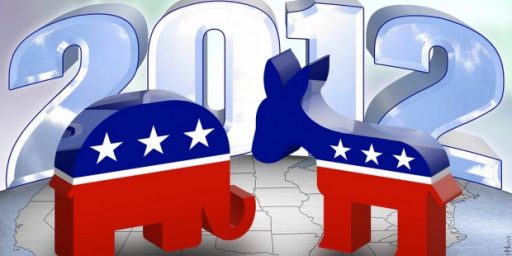Questions For Opponents Of The Sequester
Reason’s Nick Gillespie has a few questions for the people who want to rollback the impending sequestration cuts:
1. Under what sort of math do you figure that cutting $44 billion or $85 billion from a total tab of $3.6 trillion is anything more than a rounding error? Half of the cuts are slated for defense spending, which has grown massively over the past decade-plus. Do you really think that the military can’t cope?
2. Do you really believe that the sequester cuts will tank a $16 trillion economy? And if so, what’s the multiplier on that? GDP is counted in such a way that most government spending automatically gets counted as increasing the amount of economic activity (the same doesn’t hold for private spending, where different conditions hold). Do you at least agree in theory that government spending has been cut in the past without ruining the economy (and if you don’t, why not)?
3. When will conditions be right to actually cut spending? There’s a raft of anti-sequester people – such as Barack Obama – who pay lip service to the idea that government spending (especially government deficit spending) needs to stop or be reduced at some point in the future. But like St. Augustine in his partying period, they don’t want to get straight just yet. So when might that be? If we can’t afford to cut a tiny fraction of current spending now – after a year-plus of knowing this was coming and a major punting on the original deadline – when might we?
President Obama and others have said that the sequester was put in place in August 2011 with the intention, or at least the hope, that it would never actually go into effect. Instead, the across the board nature of the cuts was supposed to have scared Congress into acting. But that failed. The so-called Supercommitte worked well into November 2011 and didn’t accomplish anything, and there was no serious work toward a replacement package of cuts for the sequester in 2012. Indeed, when the deadline for the cuts inched closer just two months ago, Congress kicked the can down the road two months. Now, here were are at the end of that two month period and, again, no serious work has been done and it looks like the we’ll hit March 1st and the cuts will go into effect.
There are some pundits who seem to think that Congress will end up fixing the sequester later in March when they have to make a deal to fund the government for the rest of the Fiscal Year. Perhaps that’s true, but I somehow tend to doubt it, and it’s unclear that any new deal would be any better than the sequester. Unless the opponents of the sequester can answer those three questions above, I have to wonder why we need to get rid of it.





Heaven forbid that Fairfax County, VA share the same pain as the rest of the country. That said, I am a defense contractor, so fix the sequester!
Good blog post.
1. Liberal math.
But that said the issue with the defense cuts is not really the amount but their completely arbitrary and indiscriminate nature. Shizzle, put me in charge and we’d cut a helluva lot more than tens of billions of dollars out of DOD’s slice of the pie. But it would be targeted at unnecessary and too-costly weapons programs, not across the board, scattershot and scatterbrained.
2. No. Obviously not. Although the sheer obviousness of that fact won’t be apparent to liberals or to other milquetoast politicos. And here’s the amazing irony: Taxes, regulations and profligate federal spending already tanked the economy. The entitlement programs (“off budget,” of course, due to sheer cognitive dissonance) are what’ll put the final nails in the economy’s coffin.
3. Spending should have been cut eons ago. Along similar lines, however, people should have stopped smoking crack and crystal meth a long time ago, too. It’s tough to cure addictions. It’s hard to fight against stupid. One can rage against the machine, so to speak, but good luck trying to change it. You’d have better odds getting all the whiskey out of Ireland.
1a) Under what sort of math do you figure that cutting $44 billion or $85 billion from a total tab of $3.6 trillion is anything more than a rounding error?
$85b is 2.4% of $3.6t. If I cut your salary by 2.4% you would presumably be annoyed if not angry. The whole point of the sequester was that the cuts would have some bite. If we were talking about $85m no one would care.
1b) Half of the cuts are slated for defense spending, which has grown massively over the past decade-plus. Do you really think that the military can’t cope?
Nope. The primary impact will be economic.
2) Do you really believe that the sequester cuts will tank a $16 trillion economy?
Tank? No. But the cuts will hurt the economy; they won’t make it better.
Do you at least agree in theory that government spending has been cut in the past without ruining the economy (and if you don’t, why not)?
Of course.
3) When will conditions be right to actually cut spending?
When the unemployment rate is within rounding distance of 6% rather than 8%, which was the case from 1994 up through 2008.
This isn’t making the perfect the enemy of the good.
This is setting two bads at odds and ignoring any real and authentic good.
A good would be a budget designed for our times and our problems. It would be as large as it has to be for those, and no more.
That pragmatism is nowhere in sight.
Easy, when it’s not being cut from the entire 3.6 trillion budget. Certain portions of the budget aren’t being cut by the sequester, so the correct evaluation of the sequester should focus on the portions being cut only.
As the sequester is currently implemented, it will definitely cost the economy jobs and lower GDP. The recover has already been slowed down by cuts in public sector employment, so the sequester is probably the wrong policy now.
Pretty much never. We could discuss reducing the deficit, or slowing spending growth, but it should be expected that the entire federal budget continues to increase.
Not that I expect Gillespie to respond to any challenge, but it’s a simple relationship:
Spending = Income = Employment = Output. That more than answers #1 and #2.
# 3 is a little more interesting. Why exactly should we cut net spending? If the goal is to improve quality of government’s output then I applaude it. There are much better uses for our resources than we see in many areas of government and spending should be shifted to support them.
But that isn’t Gillespie’s meaning, is it? He simply wants total government spending to drop, because he dislikes government spending (unless that spending benefits the rentier class his magazine is devoted to defending). There’s no economic argument there beyond “markets are more efficient” claptrap that thirty years of failed privatization have already put to rest.
Why must the sum total of government spending be reduced?
Gillespie’s questions especially that first one is just dishonest, as if this is some one-off game with binary choices in a contextless vacuum. It’s a mug’s game.
Gillespie is accepting the Beltway Very Serious People consensus that the deficit is the mostest terrible seriousest problem ever: and we must do something desperate to deal with it right now. I thought this was supposed to be OUTSIDE the Beltway. We can, like Britain, go full austerity to deal with our deficit. Or we can go for growth and employment which will allow us to easily deal with the deficit later. Britain is demonstrating that the austerity approach is self defeating.
Three things drive this Beltway consensus:
– Class war. Tight money is good for rich people (only short term, but that seems to be the only way they think).
– Conservative/Libertarian ideology, i.e. I got mine and frack you.
– Conservative psychology, the need for hard, fast rules; which leads to an inability to understand timing issues. They can’t comprehend that we must deal with the deficit, but not right now.
Our VSPs are like a homeowner with a bad roof and a kitchen fire telling the fire department he has to fix the roof before they can pour water on the fire.
So the answer to Gillespie’s questions is:
1 and 2 – who cares, you’re doing the wrong thing, why sweat the details
3 – right after unemployment and GDP growth hit some reasonable target.
I’ll answer Nick Gillespie’s questions when he answers this one.
Both Japan in 1997 and the US in 1937 felt that their economies had improved enough that they could reduce government spending. That austerity caused severe recessions that were not only incredibly painful but made the government debt worse. Britain has also tried that approach recently and looks to be heading for its third recession in four years.
Why does he think our outcome will be any better?
it’s a win-win situation for obama and he knows it. he can brag that “we” cut spending a little bit and if something bad comes out of it he can say he didn’t support it. what’s so hard about that? and given the vast ocean of debt we have, it’s a splash at best. like we’re going to have to wait hours to get through the airport…..god forbid.
@bill:
But that analysis doesn’t really hold up given that Obama and the Democrats are proposing to replace the sequester, not eliminate it. They want to reduce the deficit by the same amount, so it’s the GOP that are insisting that the sequester be implemented as is. What you’re describing as a “win-win for Obama” doesn’t make sense as a GOP plan.
I wonder if this isn’t a complete rope-a-dope play by Obama. Probably we’re going to stick with the present sequester. It’s only if the howls get loud enough that Congress will do anything to try to replace it. And the Republicans are sufficiently terrified of being right-sided in the primaries that they’ll probably hold the line.
After which Obama can just point out that hey, he was quite willing to put something else in play but the other side wouldn’t go along with it…
I tend to get tired of explaining the fact that the cuts are short-sighted, may make the long term debt situation worse, and are practically impossible to implement. The FAA will have to halt it’s air traffic modernization program and institute a hiring freeze. Good luck seeing how that works out for the future.
You want to cut spending? Then reduce the scope of government. But you don’t get to ask for the same services and cut spending in indiscriminate and stupid ways and magically expect everything to go smoothly.
Wow, a Nick Gillespie analysis ? Was Ben Stein not available ?
Every honest economic analysis out there shows that the sequester as structured will slow the economy and cost jobs. Are the Democrats exaggerating? Probably but contractionary policy will contract the economy.
Just look at the UK.
And at the least, can people for the sequester deal with what the sequester is. We aren’t eliminating waste or unnecessary programs, we aren’t putting the entire budget to the ax, and some of the cuts don’t even have real impact on the deficit. Once again, I’d like to point out the FAA. Only one third of the FAA’s budget comes from the general fund. We aren’t completely independent like the post office, but the logic still exists. If you cut air traffic operations, you cut the main revenue source for the FAA… which causes the FAA to supplement more of it’s budget with the general fund.
The sequester is meant to be an unworkable joke. No amount of glibertarian nonsense changes that.
@TheColourfield:
Doug’s a sucker for a man in a leather jacket. Who doesn’t want to listen to the Fonzi of freedom
“When will conditions be right to actually cut spending?”
The conditions will be right to cut spending when the real economy is growing strongly and unemployment is rapidly declining. We are a long way yet from meeting those conditions.
@Console:
I’m pretty sure that makes Doug the Ralph Malph of Freedom.
Initially, I was going to dub him the Potsie of Freedom, but Doug’s just got that Ralph Malph feeling about him.
@Console: …that I could give you a few more likes, because this is absolutely on point:
If you want to make the case that government should do less, name programs you’d cut and make the case. Live your convictions.
But this airy-fairy “limited government except the good stuff” line drives me nuts.
@Ben Wolf:
A perfect question and one that libertarians and GOPers can never answer without resorting to pablum. Seriously, Doug couldn’t provide a semi-coherent answer to this question if his life depended on it.
@Spartacus:
“I’m here to tell you about government spending and why it’s bad, mkay? So, first of all, uh, it’s bad. You shouldn’t have the government do anything. And, uh, government is bad. You shouldn’t need the government. And, uh, as for spending, well, spending money is bad. The government shouldn’t spend your money. Okay, that about wraps up my introduction, now uh, are there any questions?”
Hundres of thousands of Americans who are mentally ill will stop receiving care. Some will die, all will suffer. Some will become violent and harm innocents.
It’s no skin of Doug’s nose…
@David M: it’s not a gop plan, it’s a democrat reality- the minions are blind to any fault of obama. and raising taxes isn’t going to work well when we have so many republicans who were elected to purposely not raise taxes.
@alkali:
Once again, progressives show that they have zero interest in spending cuts. Progressives will always find an excuse (unemployment, infrastructure, social justice) to not make cuts.
If progressives do not want to have cuts, then how should the federal government raise the approximately $1 trillion dollars a years that would be required to balance the current budget let alone fund all of the new entitlements that will come in the future. What should Americans give up so that the federal government can spend $4 trillion a year?
@Spartacus:
If progressives do not want to cut spending, then how do Democrats and progressives plan to create the revenue to balance the budget. The Democrats have resorted to their own voodoo economics of taxes on the top 1% and growing their way out of debt.
@superdestroyer: Not everyone accepts your assumption that balanced budgets should be a goal.
@superdestroyer:
1. What is the economic evidence that spending no more than we take in in revenue is best for the economy? Please answer that question directly by providing evidence that operating in balance produces a better economy than operating with a deficit of any size.
2. Even if the Democratic goal is to reduce the size of the deficit & debt, what is the economic evidence that cutting spending (versus a combination of increasing spending on projects that require new workers and raising taxes), is the optimal way to do this?
3. Even if the Democratic goal was to reduce the size of the deficit & debt through spending cuts and not tax increases/new projects, what is the economic evidence that the midst of a very slow recovery is the best time to do this instead of when the recovery is in full bloom?
4. What is the economic evidence that austerity has worked in those countries that have tried it?
@superdestroyer: “Progressives will always find an excuse (unemployment, infrastructure, social justice) to not make cuts. ”
Oh, those terrible progressives, thinking that unemployment, infrastructure and social justice are more important than arbitrary spending cuts imposed for no reason except a quasi-religious fantasy about confidence fairies and bond vigilantes. No wonder you hate them, SuperDope.
What is troubling (and slightly amusing) is that the biggest complainers / fear mongerers are the same folks who voted and passed the legislation.
We just had about a 3% increase in the payroll tax that hit everyone – why is that being swept under the carpet and not discussed; So it’s OK to raise taxes in a poor economy (Obama flip flopped on this one) and it’s disaster to cut spending by about the same amount 2.4% or so
@Spartacus:
balanced budgets are sustainable in the future. Deficit spending eventually has to be dealt with by either default, increased taxes, or inflation. As the joke goes, anything that cannot go on forever, will not go on forever.